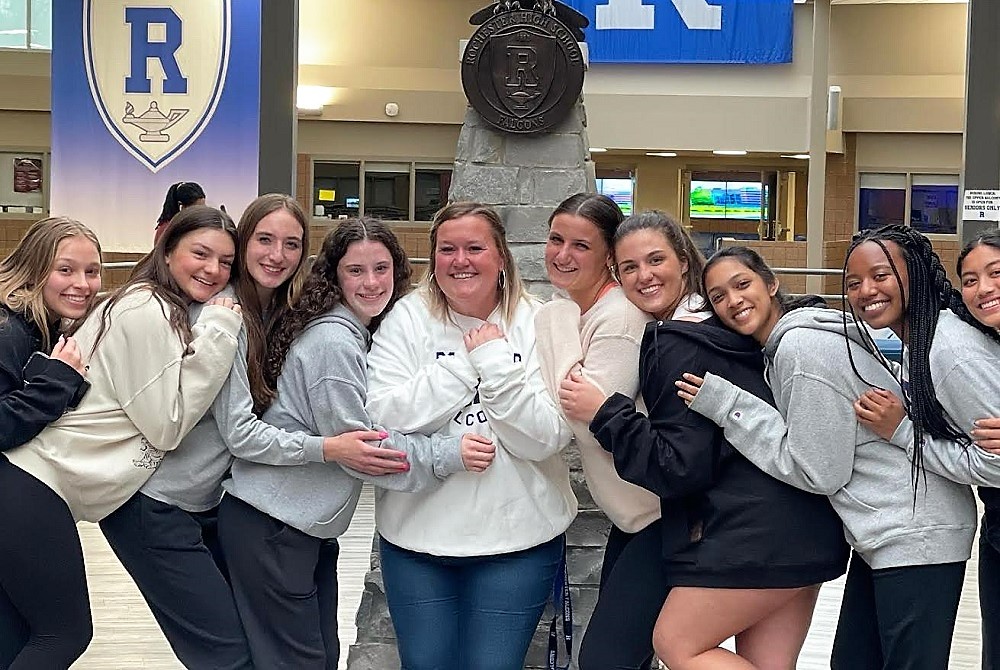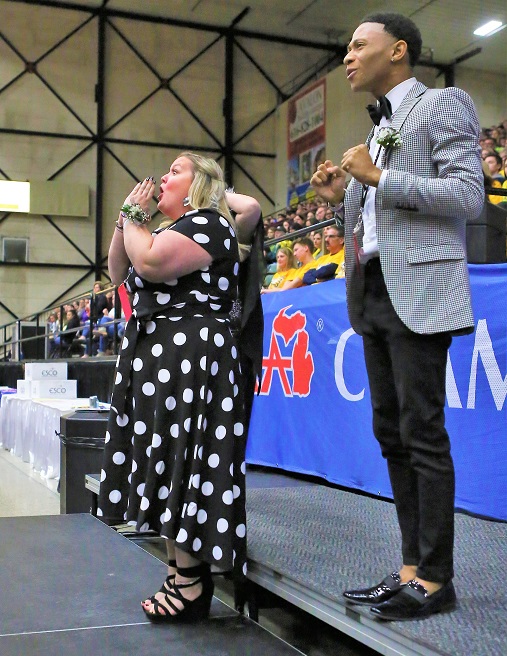
Thank Roosevelt for Football Weekends
December 20, 2013
By Rob Kaminski
MHSAA benchmarks editor
The next time you find yourself immersed in a tense crosstown football rivalry on a Friday night followed by a Saturday pilgrimage to the nearest college campus and a Sunday afternoon with a remote and your favorite snacks and beverages, take a moment to consider what the weekend would be like if it weren’t for Teddy Roosevelt.
The man who became our 26th President shortly after the turn of the 20th Century following the assassination of William McKinley in 1901 was a football fan like you. Maybe more so.
Today’s game of football has reached a critical crossroads. Player size and speed have increased across the board. Savage use of equipment as weapons rather than protective gear has been glorified on television networks and social media. Leaders of the game at all levels have recognized the need for change, employing new rules and widespread educational efforts to aid in preserving the sport.
History, as they say, is repeating itself.
In an ironic twist, it was Roosevelt who saved the then-brutally violent game of football from itself more than 100 years ago. Yes, the same “Rough and Ready Teddy” who led the charge up San Juan Hill during the Spanish-American War and often sparred in the boxing ring while in office from 1901-09 opined that football was becoming so gruesome that he delivered an ultimatum: clean up the game or it would be outlawed.
The Chicago Tribune reported that in 1904 alone, there were 18 football deaths and 159 serious injuries, mostly among prep school players. Football deaths suffered by younger players were reported on a nearly weekly basis, as outraged citizens called on colleges and high schools to banish football outright.
In stepped Roosevelt, who called head coaches and representatives from Harvard, Yale and Princeton – college powers at the time – to the White House in 1905 urging them to eliminate excessive violence and set an example of fair play for the rest of the country. When the casualties actually rose by one during the ensuing season, Roosevelt reacted with greater resolve and convened leading football authorities for the purpose of authoring drastic rules changes. What emerged was an intercollegiate conference which was the predecessor of the NCAA.
Among the most effective changes for the 1906 season were the legalization of the forward pass, the elimination of mass formations, and the creation of a neutral zone. Football fatalities fell to 11 in each of the next two seasons, and severe injuries fell drastically.
Thanks to the introduction of protective equipment and ever-evolving rules changes, football during the 100-plus years to follow has become an exponentially safer game. Yet, the game’s leaders always will need to adjust and react to scrutiny that comes with the territory.
So, as the game once again undergoes rules modifications in the name of safety, give a tip of the cap to President Roosevelt while you enjoy college bowl season and the NFL playoffs and begin to think ahead to the first high school practice of 2014.

Koehler Gives State Power Rochester Another Championship-Caliber Leader
By
Keith Dunlap
Special for MHSAA.com
December 8, 2022
ROCHESTER HILLS – Understandably, Rochester competitive cheer head coach Samantha Koehler might not know exactly the emotions she will feel Friday.
 After all, the occasion will mark a first in more than four decades with a Rochester program that’s historically been considered the gold standard in the state.
After all, the occasion will mark a first in more than four decades with a Rochester program that’s historically been considered the gold standard in the state.
When the Falcons compete at their first competition of the season at Troy, it will be the first time since 1981 that somebody other than the legendary Susan Wood will be at the helm of the program.
“Even with a change in leadership, we’re eager to show the world that Rochester cheer is back and better than ever,” Koehler said.
While there will probably be some nervousness, it also might be a relief to actually get into competition mode after an offseason of transition.
Following Rochester’s fifth-place finish in March at the Division 1 Final, Wood announced her retirement after 41 years as head coach.
All Wood (formerly Susan McVeigh) did during her tenure was lead Rochester to 14 MHSAA Finals championships and three runner-up finishes between 1994 and 2017.
She also led Rochester to five Michigan Cheerleading Coaches Association state titles and three runner-up finishes before competitive cheerleading became an MHSAA-sponsored sport in 1994.
In 36 out of 41 years with Wood in charge, Rochester competed in Finals of either MHSAA or MCCA state tournaments.
But rather than look at this as having to replace an irreplaceable legend, Koehler is looking at it as a chance to continue Rochester’s rich tradition – and such an opportunity was simply too good to pass up.
 “Yes, this position comes with a lot of high expectations and pressure,” Koehler admitted, while also praising the parents and team members who have helped make the transition easier. “But like George S. Patton, Jr. once said, pressure makes diamonds.”
“Yes, this position comes with a lot of high expectations and pressure,” Koehler admitted, while also praising the parents and team members who have helped make the transition easier. “But like George S. Patton, Jr. once said, pressure makes diamonds.”
Koehler has had plenty of success as well, having spent the last seven years as head coach at Plymouth High School, where she was named Michigan cheer Coach of the Year in 2020 after leading Plymouth to a runner-up finish in Division 1.
She also has served as the head cheerleading coach at Wayne State University and on the board for the state coaches association.
“We wanted somebody with experience that coached at a high level and had success at a high level, because that’s where we are,” Rochester athletic director Dean Allen said. “The bar is high, and keep it there. Just keep Rochester cheer as the preeminent program in the state of Michigan. That was our goal.”
Allen said the biggest challenge has been for Koehler to balance out bringing in her own ideas, but also maintaining traditions that have made the program what it is.
So far, so good.
“She’s been able to do that,” Allen said.
While the last few months have been all about getting to know her new team and community, the coming winter will be about trying to get Rochester back on top at the Finals in March.
The Falcons haven’t won Division 1 since 2017, and have seen city rivals Stoney Creek (in 2019) and Rochester Adams (2020 and 2021) claim the last three championships between them.
“We are fortunate enough to compete against two of the best teams in the state frequently throughout the season,” Koehler said. “Competing against Adams and Stoney betters our program by motivating athletes and coaches to be the best we can be each and every day. With such a talented and dedicated group of athletes, we are excited and eager to challenge our city rivals for that state championship.”
 Keith Dunlap has served in Detroit-area sports media for more than two decades, including as a sportswriter at the Oakland Press from 2001-16 primarily covering high school sports but also college and professional teams. His bylines also have appeared in USA Today, the Washington Post, the Detroit Free Press, the Houston Chronicle and the Boston Globe. He served as the administrator for the Oakland Activities Association’s website from 2017-2020. Contact him at [email protected] with story ideas for Oakland, Macomb and Wayne counties.
Keith Dunlap has served in Detroit-area sports media for more than two decades, including as a sportswriter at the Oakland Press from 2001-16 primarily covering high school sports but also college and professional teams. His bylines also have appeared in USA Today, the Washington Post, the Detroit Free Press, the Houston Chronicle and the Boston Globe. He served as the administrator for the Oakland Activities Association’s website from 2017-2020. Contact him at [email protected] with story ideas for Oakland, Macomb and Wayne counties.
PHOTOS (Top) Samantha Koehler, middle, is taking over the Rochester High competitive cheer program this season. (Middle) Koehler, with her Plymouth assistants, coach their team during the 2020 Division 1 Final. (Top photo courtesy of Dean Allen/Rochester Athletics. Middle photo by Hockey Weekly Action Photos.)

